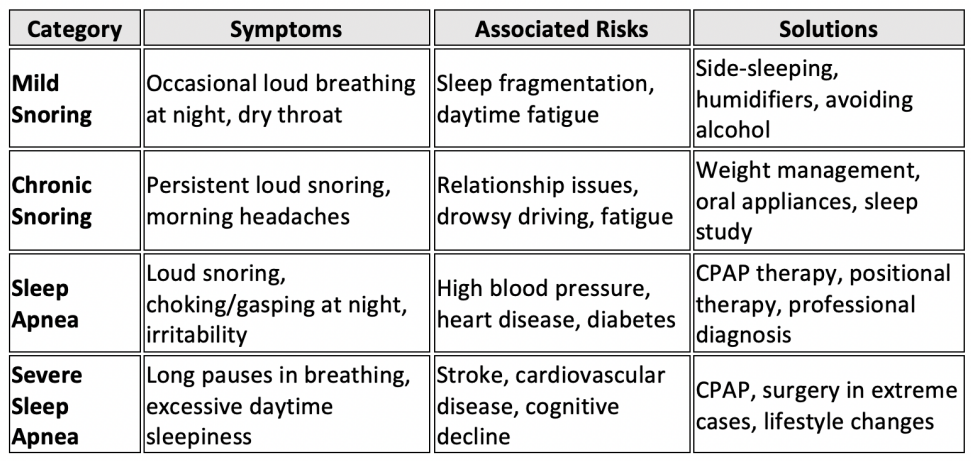Snoring is often dismissed as a minor annoyance, but its consequences extend far beyond nighttime noise. Chronic snoring can significantly disrupt sleep quality, impair daily functioning, and contribute to long-term health risks. From cardiovascular complications to social and workplace challenges, the effects of snoring warrant serious attention.
This article examines how snoring impacts overall wellness and provides practical strategies for managing sleep disruptions effectively.
Understanding the Impact of Snoring on Sleep Quality

Sleep is essential for cognitive function, emotional stability, and physical health. However, snoring disrupts the sleep cycle, leading to sleep fragmentation and daytime fatigue.
How Chronic Snoring Disrupts Deep Sleep and Hurts Your Health
- Interrupted Sleep Stages: Snoring prevents the body from reaching deep, restorative sleep (REM and slow-wave sleep).
- Cognitive Effects: Poor sleep quality correlates with reduced memory retention, impaired problem-solving skills, and difficulty concentrating.
- Mood Changes: Sleep deprivation contributes to irritability, anxiety, and increased risk of depression.
- Unnoticed Sleep Fragmentation: Many individuals wake up briefly due to snoring without realizing it, resulting in chronic fatigue.
A study1 published in the Journal of Clinical Sleep Medicine found that individuals with chronic snoring or sleep apnea had significantly lower cognitive performance than those with uninterrupted sleep. Addressing snoring can improve mental clarity and overall well-being.
Real-life example: A 45-year-old marketing executive found that after treating his chronic snoring, he no longer needed afternoon coffee to stay alert during meetings, and his quarterly performance reviews improved due to enhanced focus and decision-making abilities.
Snoring: Hidden Cardiovascular and Metabolic Risks

Chronic snoring is often associated with obstructive sleep apnea (OSA), but recognizing the signs you may have sleep apnea, such as frequent gasping, daytime exhaustion, or morning headaches, is essential for early intervention. Sleep apnea increases the risk of serious health problems, including heart disease and metabolic disorders.
Health Risks Linked to Snoring
- Hypertension: Repeated oxygen deprivation during sleep raises blood pressure levels, increasing the risk of stroke and heart attacks.
- Heart Disease: Obstructive sleep apnea strongly correlates with an increased likelihood of cardiovascular disease.
- Weight Gain and Metabolic Issues: Disrupted sleep affects appetite-regulating hormones (ghrelin and leptin), leading to higher calorie consumption and obesity risk.
- Type 2 Diabetes: Poor sleep quality interferes with glucose metabolism, elevating the risk of insulin resistance and diabetes.
According to a study2, untreated sleep apnea increases the likelihood of developing hypertension. Managing snoring early can prevent long-term health complications.
Real-life example: A 58-year-old patient with undiagnosed sleep apnea reduced his blood pressure medication by half after six months of consistent CPAP therapy, demonstrating the direct link between sleep quality and cardiovascular health.
Social and Safety Concerns Arising from Snoring
Snoring does not only affect the individual. It also disrupts the sleep of bed partners and impacts daily productivity. Beyond personal well-being, chronic snoring can influence relationships, work performance, and even public safety.
Consequences of Chronic Snoring
- Relationship Effects: Bed partners often experience sleep deprivation, leading to frustration and decreased relationship satisfaction.
- Increased Accident Risk: Sleep deprivation caused by snoring contributes to drowsy driving, which is a leading cause of motor vehicle accidents.
- Workplace Productivity Decline: Employees who suffer from chronic sleep disruptions report lower energy levels, difficulty focusing, and higher absenteeism rates.
- Household Tension: The repeated disturbances can create conflict, impacting the emotional well-being of both partners.
A survey by the National Sleep Foundation3 found that one in four couples sleep in separate rooms due to snoring-related disturbances. Addressing snoring can enhance personal and social well-being.
Real-life example: A couple on the verge of divorce due to sleep-related conflicts found that after the husband’s successful treatment for sleep apnea, they were able to share a bedroom again, reporting improved communication and relationship satisfaction within three months.
Enhancing Overall Wellness Through Snoring Management
While snoring can be disruptive, some of the best ways to stop snoring naturally include lifestyle adjustments, improved sleep hygiene, and targeted interventions. Addressing snoring improves personal health, strengthens relationships, and enhances daily performance.
Evidence-Based Strategies for Managing Snoring
- Medical Interventions: Continuous Positive Airway Pressure (CPAP) therapy, oral appliances, and surgical options for severe cases.
- Lifestyle Changes: Maintaining a healthy weight, avoiding alcohol before bed, and sleeping on the side rather than the back.
- Sleep Hygiene Improvements: Establishing a consistent sleep schedule, reducing screen exposure before bedtime, and using humidifiers to keep airways open.
- Professional Consultations: Undergoing a sleep study to diagnose underlying sleep disorders and receive targeted treatment.
Research4 found that patients who used CPAP therapy for at least four hours per night experienced a 35% improvement in daytime alertness and mood stability. Consistent treatment can lead to long-term health benefits.

Real-life example: According to her sleep tracking app, a 38-year-old teacher who implemented side-sleeping techniques and used a mandibular advancement device reduced her snoring by 70%. Her students noted her increased energy and enthusiasm in morning classes, highlighting how simple interventions can yield significant results.
Another case that struck me was when a man came to my office and said, “Now that I’m older, I started snoring a lot,” in a joking tone, without taking it too seriously. I explained all the impacts of snoring on our health, and at the end of the consultation, I referred him to a sleep study. The result was a severe case of apnea (38 apneas per hour and apneas lasting up to 55 seconds). He then started using CPAP, which is not easy to adapt to5. However, with the right guidance and patience, he significantly improved his quality of life and health.
Snoring is more than just a nighttime disturbance. It carries significant consequences for physical health, mental well-being, relationships, and workplace performance. Taking proactive steps to manage snoring can lead to better sleep, improved energy levels, and long-term health benefits.
If snoring affects your quality of life, consider consulting a healthcare professional to explore effective treatment options. Better sleep contributes to a healthier, more productive life.
For more insights on sleep health and wellness, keep following Bright Path to Wellness.
*This article is for informational purposes only and does not constitute medical advice. If you have concerns about your health, please consult a healthcare professional.
About the Author
Carla Picolli is a psychologist, sleep expert, author, and mental health advocate. With over two decades of experience in mental health and wellness, Carla helps individuals build sustainable habits for a healthier, happier life.
References
1. https://pmc.ncbi.nlm.nih.gov/articles/PMC2546461/
2. https://doi.org/10.1056/NEJM200005113421901
3. https://www.thensf.org/wp-content/uploads/2025/03/NSF_SIA_2025-Report_final.pdf
4. https://doi.org/10.5664/jcsm.6504
5. https://www.health.harvard.edu/blog/i-cant-tolerate-cpap-what-can-i-do-2020072920672
6. https://www.resmed.com/en-us/sleep-apnea/sleep-blog/living-with-cpap-7-tips-for-a-better-experience/


I really appreciate how this article digs deep into the far-reaching consequences of chronic snoring beyond just a noisy night, it shows how disrupted sleep can impair our cognitive function, mood, and even physical health by increasing risks like hypertension and heart disease. The inclusion of real-life examples, such as the improvement in a teacher’s alertness after adopting side-sleeping techniques, really underscores the practical impact of these issues. It got me wondering: for those who’ve experienced similar sleep disruptions, what lifestyle or treatment changes have made the most noticeable difference in your overall wellness, and how has addressing snoring reshaped your daily performance and relationships?
Thank you for your thoughtful comment, Dan! For those with sleep apnea, treatments like CPAP therapy or oral appliances have been life-changing, enhancing focus, energy, and even strengthening relationships by eliminating sleep disruptions.
Snoring is often overlooked, but this article does a great job of highlighting its serious consequences beyond just being a nuisance. Poor sleep quality from chronic snoring can lead to cognitive decline, mood disturbances, and even increased cardiovascular risks. The real-life examples really drive home the point that addressing snoring can dramatically improve overall well-being—whether it’s boosting workplace performance, improving relationships, or even reducing the risk of serious health conditions like hypertension and diabetes. It’s eye-opening to see how untreated sleep apnea can have such a profound impact, yet solutions like CPAP therapy, lifestyle changes, and sleep studies can make a significant difference. If snoring is disrupting sleep, seeking professional help is crucial for long-term health and daily productivity. This article is a must-read for anyone looking to improve their sleep quality and overall wellness!
I’m glad the article shed light on the often-overlooked consequences of snoring, Andre! Thank you for highlighting these important points, and I hope the information continues to promote awareness about the significance of addressing snoring for a healthier life.